We may not have the course you’re looking for. If you enquire or give us a call on 01344203999 and speak to our training experts, we may still be able to help with your training requirements.
Training Outcomes Within Your Budget!
We ensure quality, budget-alignment, and timely delivery by our expert instructors.
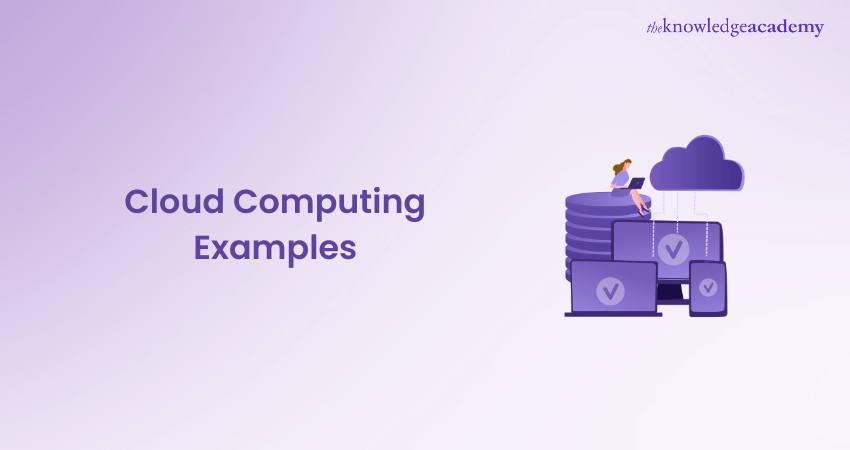
Are you curious about how Cloud Computing is shaping the world around us? Imagine being able to access powerful software, vast data storage, and complex applications at your fingertips, all without the burden of hefty hardware costs. This is the magic of Cloud Computing—a game-changer across various industries. Discover Cloud Computing Examples that highlight its impact on business, healthcare, education, and more.
From nimble startups to tech behemoths, let’s embark on a journey through real-world Cloud Computing Examples that showcase the versatility and impact of cloud technology. Buckle up because we’re about to witness how Cloud Computing is revolutionising businesses and everyday experiences.
Table of Contents
1) What is Cloud Computing?
2) What are the Main Types of Cloud Computing with Examples?
a) SaaS Cloud Computing Examples
b) IaaS Cloud Computing Examples
c) PaaS Cloud Computing Examples
3) Conclusion
What is Cloud Computing?
Cloud Computing is a transformative technology that permits users to access and store data, applications, and services over the internet. It eliminates the need to rely on local servers or personal devices. Cloud Computing uses remote servers to provide on-demand access to data storage and computing power without requiring direct user management.
This technology provides numerous benefits, including flexible resource allocation, cost efficiencies, and the ability to scale services quickly. Businesses can innovate and adapt more easily with Cloud Computing, which supports applications from data storage to advanced analytics and AI. It has revolutionised company operations, enabling efficient service delivery and agile responses to market demands.
What are the Main Types of Cloud Computing with Examples?
Cloud Computing is categorised into several Cloud Computing Service models, each catering to different business needs. The main types are Software-as-a-Service (SaaS), Infrastructure-as-a-Service (IaaS), and Platform-as-a-Service (PaaS). Let's explore these types with real-world examples.
1) SaaS Cloud Computing Examples
This model offers complete applications over the internet, which you can utilise using a web browser, mobile app, or APIs. The service provider takes care of all the technical details, allowing you to enjoy the application without worrying about maintenance.
a) Airbnb
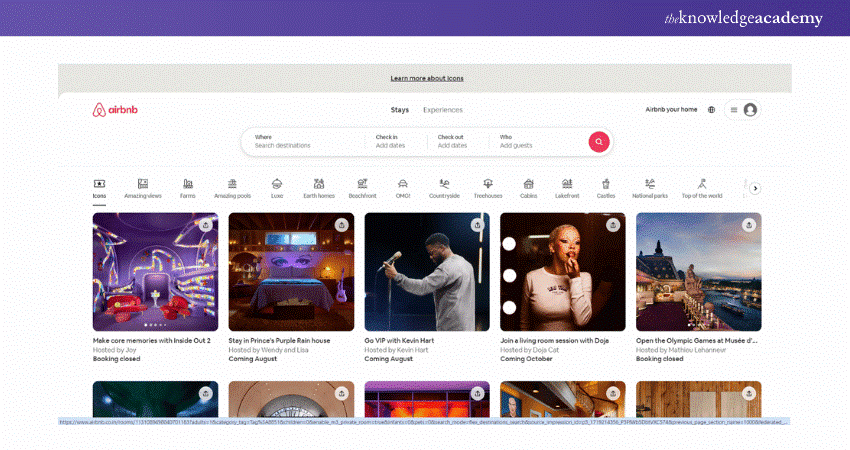
Founded in 2008, Airbnb generated £ 7.83 billion in revenue for fiscal year 2023, reflecting substantial growth. Airbnb connects homeowners renting their properties with travellers seeking unique short-term stays, offering an alternative to traditional hotels.
Operating globally using a SaaS model, the platform has transitioned its architecture from monolithic to microservices. Utilising a Service-oriented Architecture (SOA), Airbnb refined its system to address developer challenges with architectural complexity, enhancing efficiency and scalability.
b) Netflix
As of the first quarter of 2024, Netflix boasts around 269.6 million paid subscribers worldwide. Founded in 1997, Netflix initially competed with Blockbuster by renting DVDs. A critical data centre glitch and scaling issues with its monolithic architecture prompted Netflix to transition to online streaming.
The shift to a microservices architecture allowed Netflix to isolate updates, enhance personalisation, and utilise Content Delivery Networks (CDNs) for faster, cost-effective content delivery. Recently, Netflix announced plans to optimise its £800 million AWS cloud bill by better managing stored data.
c) Uber
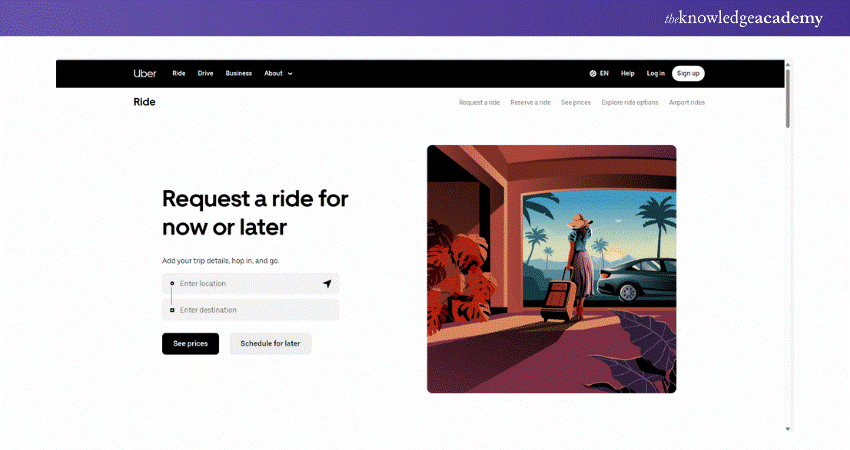
Founded in 2009, In the fourth quarter of 2023, 150 million people used the Uber app at least once per month. Uber is a taxi-hailing platform that connects drivers with passengers through a mobile app, facilitating over 24 million trips a day. It also offers package and meal delivery services.
Operating on a SaaS model with cross-platform compatibility (Android and iOS), Uber transitioned from a monolithic to a microservices architecture. This shift enabled safer experimentation, faster growth, and enhanced flexibility and scalability.
d) Salesforce CRM
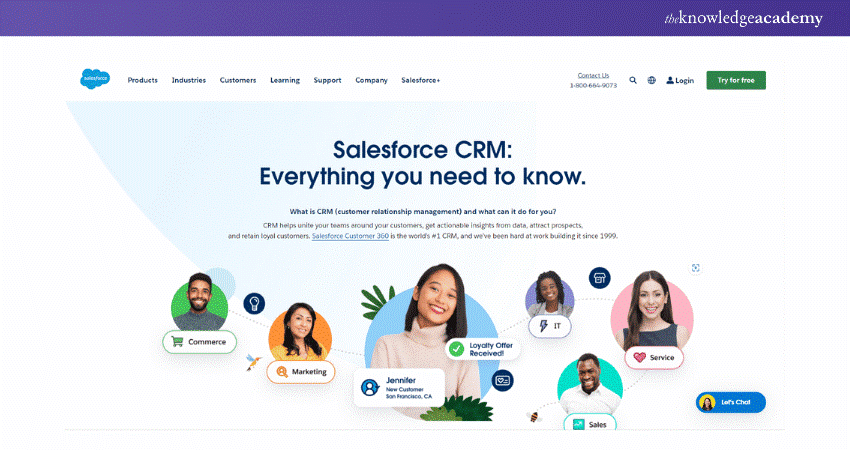
Salesforce is a leading SaaS provider known for its CRM tool, which aids businesses in managing customer relations and generating sales leads. The Sales Cloud integrates AI with customer data to help sales teams identify leads and close deals more efficiently. Additionally, Salesforce offers dedicated clouds for customer service and marketing.
e) Zoom’s Video Conferencing Platform
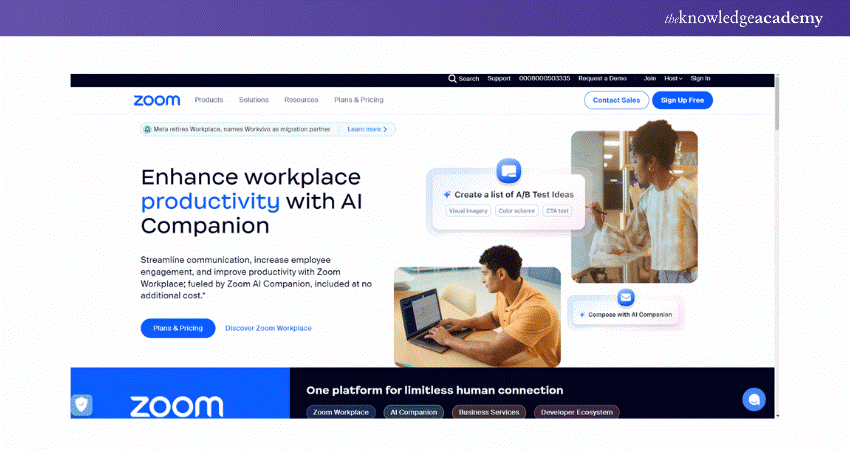
This is a cloud-based audio and video communication tool that allows users to record their meetings and save them in the cloud for convenient access. Teams can utilise the Zoom Developer Platform to create apps and integrations. Notable customers include Ally Financial, Dropbox, and the University of Miami, who have benefited from Zoom’s collaborative technology.
f) Finix’s Payment Processing Software
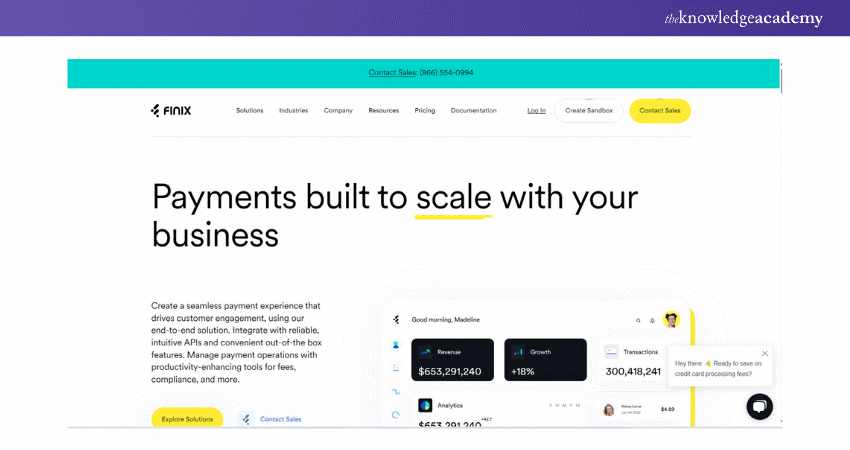
Finix’s payment processing software helps software companies and marketplaces streamline in-house payments. It offers tools for payment gateway, tokenisation, merchant onboarding, reporting, and settlement, all within a single platform. This integration simplifies the payment process, enhances efficiency, and eliminates the need for multiple systems, making financial management easier for businesses.
Join Certified Artificial Intelligence (AI) For Cloud Professionals Training and boost your expertise – sign up today!
2) IaaS Cloud Computing Examples
IaaS provides fundamental computing resources like processing power and storage over the cloud. It’s similar to traditional setups but with more control over the infrastructure, allowing for customisation according to your needs.
a) IBM’s Bare Metal IaaS Servers
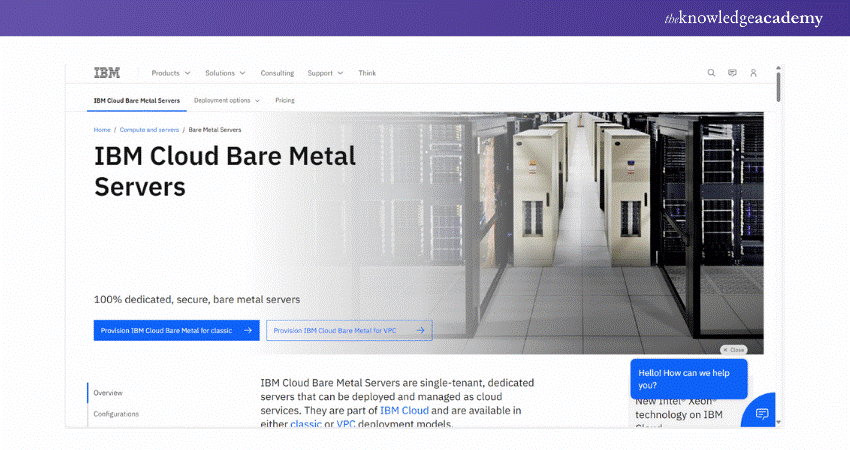
IBM’s IaaS offers both bare metal and virtual servers. Bare metal servers, deployed within hours, support projects up to three terabytes, providing high performance for intensive tasks. Virtual servers, deployed in minutes, offer flexibility and scalability for dynamic workloads, making IBM’s IaaS versatile for various computing needs.
b) DigitalOcean’s Cloud Website Hosting
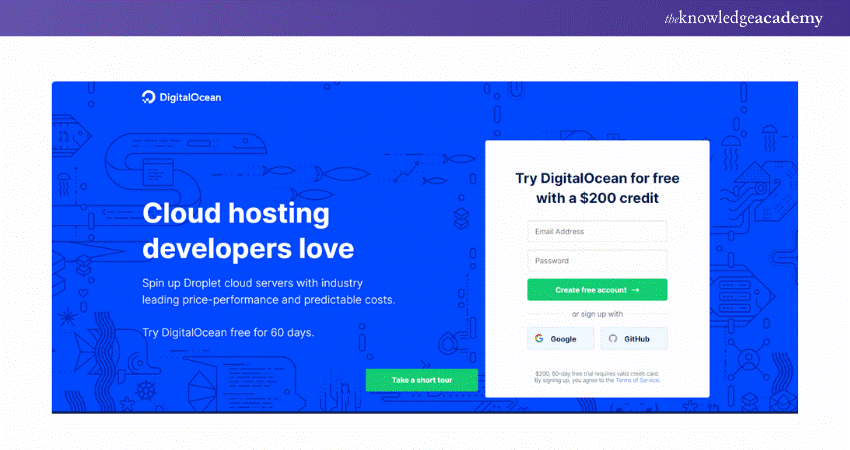
DigitalOcean’s app platform helps teams deploy, manage, and scale websites efficiently. Users can quickly create virtual machines and scale them according to data storage and traffic needs. Clients such as Cerebrus, Unicodemy, and DSRV benefit from this flexibility and scalability.
Master cloud technologies and advance your career – join our Cloud Computing Courses today!
3) PaaS Cloud Computing Examples
PaaS simplifies application development by providing a ready-to-use platform that eliminates the need to manage the underlying infrastructure. It offers various tools and services for building, testing, and deploying applications efficiently.
a) Google App Engine
This is a completely managed serverless platform for building and hosting scalable web applications. Supporting languages like Java, Python, PHP, and Go, it offers versatility for developers. The platform features automatic scaling, adjusting resources based on demand for efficient performance and cost management.
Integrated logging and monitoring track application health while built-in security protects against vulnerabilities. Ideal for web applications, mobile backends, and IoT Applications, Google App Engine provides a robust environment for development and deployment.
b) Microsoft Azure App Service
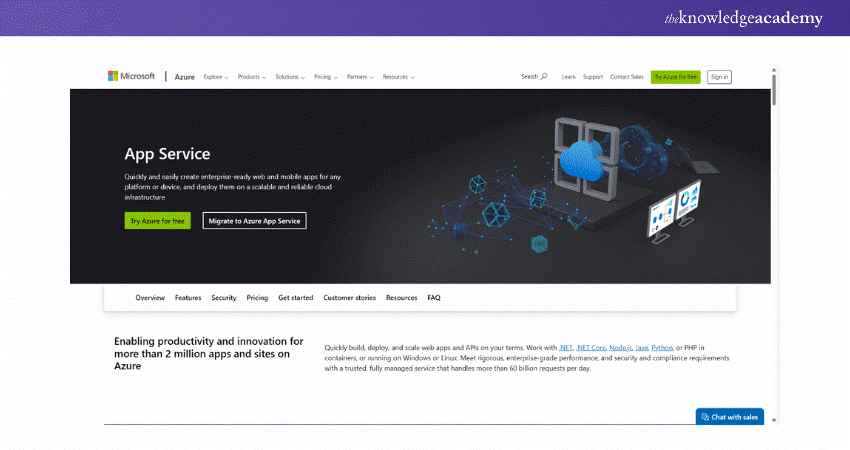
This is a cloud-based platform for building, deploying, and scaling web applications, RESTful APIs, and mobile backends. Supporting .NET, Java, Node.js, PHP, Python, and Ruby, it offers automatic scaling and high availability for handling varying loads. Integrated DevOps capabilities, including CI/CD, streamline development for quick updates.
Enterprise-grade security features protect sensitive data and applications. Ideal for enterprise web applications, API services, and mobile backends, Azure App Service provides a comprehensive environment for modern development.
c) AWS Elastic Beanstalk
AWS Elastic Beanstalk is an easy platform for launching and scaling web applications and services. It allows a variety of programming languages, including Java.NET, PHP, Node.js, Python, Ruby, Go, and Docker. It manages deployment, capacity provisioning, load balancing, auto-scaling, and health monitoring, allowing developers to focus on coding rather than infrastructure.
Integrated with AWS services like Amazon RDS, S3, and CloudWatch, Elastic Beanstalk offers a comprehensive ecosystem for application development and monitoring. It is ideal for web applications, microservices, and enterprise applications.
d) Heroku
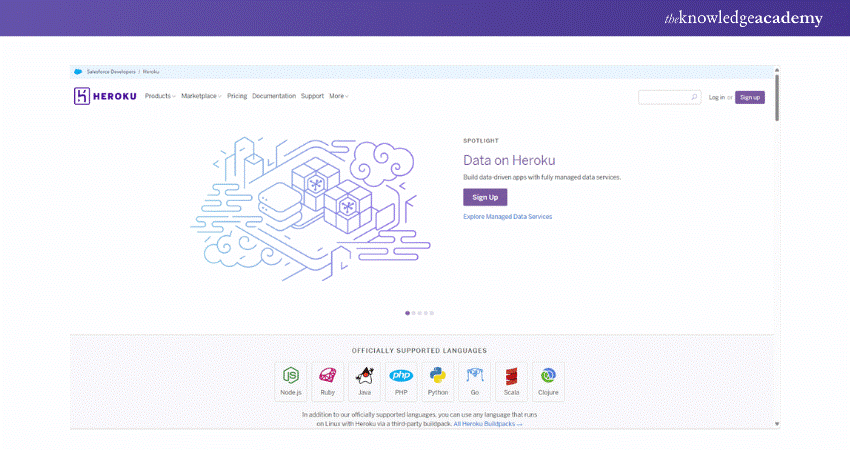
This is a cloud Platform-as-a-Service (PaaS) that simplifies building, running and operating applications. Supporting multiple programming languages like Ruby, Java, Node.js, and Python, it offers easy deployment via Git.
With a range of add-ons for databases, monitoring, and email services, Heroku is popular among startups and agile teams. Its ease of use and scalable infrastructure make it ideal for quickly building and scaling web and mobile applications.
e) IBM Cloud Foundry
This is an open-source Platform-as-a-Service (PaaS) offering developers a choice of clouds, frameworks, and services. Supports multiple languages and frameworks, offering flexibility. Multi-cloud support allows deployment on public, private, or hybrid clouds.
Built-in DevOps tools enable continuous integration and delivery (CI/CD). The platform is ideal for multi-cloud applications, enterprise-grade solutions, and cloud-native microservices. It offers a comprehensive development environment.
Enhance your Cloud Computing skills with our expert Cloud Computing Training – sign in today for a brighter future!
Conclusion
In this blog, we explored various Cloud Computing Examples that highlight the transformative power of cloud technology across different sectors. From SaaS to IaaS and PaaS, these examples demonstrate how cloud solutions drive flexibility, efficiency, and innovation. Embrace the cloud to unlock new possibilities and success!
Dive into the future of scalable software with Microservices Architecture Training – Register today!
Frequently Asked Questions

Cloud Computing is used for data storage and backup, allowing easy access and recovery. It enables scalable computing power for businesses, accommodating varying workloads. Additionally, it supports software development and testing by providing flexible, on-demand resources.

The five traits of Cloud Computing are on-demand self-service, broad network access, resource pooling, rapid elasticity, and measured service. These features ensure efficient, scalable, and cost-effective access to computing resources over the internet.

The Knowledge Academy takes global learning to new heights, offering over 30,000 online courses across 490+ locations in 220 countries. This expansive reach ensures accessibility and convenience for learners worldwide.
Alongside our diverse Online Course Catalogue, encompassing 17 major categories, we go the extra mile by providing a plethora of free educational Online Resources like News updates, Blogs, videos, webinars, and interview questions. Tailoring learning experiences further, professionals can maximise value with customisable Course Bundles of TKA.

The Knowledge Academy’s Knowledge Pass, a prepaid voucher, adds another layer of flexibility, allowing course bookings over a 12-month period. Join us on a journey where education knows no bounds.

The Knowledge Academy offers various Cloud Computing, including Cloud Computing Training, Certified Artificial Intelligence (AI) For Cloud Professionals Training and Microservices Architecture Training. These courses cater to different skill levels, providing comprehensive insights into Cloud Computing Salary.
Our Cloud Computing Blogs cover a range of topics related to Cloud Computing, offering valuable resources, best practices, and industry insights. Whether you are a beginner or looking to advance your Cloud Computing skills, The Knowledge Academy's diverse courses and informative blogs have got you covered.
Upcoming Cloud Computing Resources Batches & Dates
Date
 Cloud Computing Training
Cloud Computing Training
Thu 13th Feb 2025
Thu 10th Apr 2025
Thu 12th Jun 2025
Thu 14th Aug 2025
Thu 9th Oct 2025
Thu 11th Dec 2025







 Top Rated Course
Top Rated Course



 If you wish to make any changes to your course, please
If you wish to make any changes to your course, please


